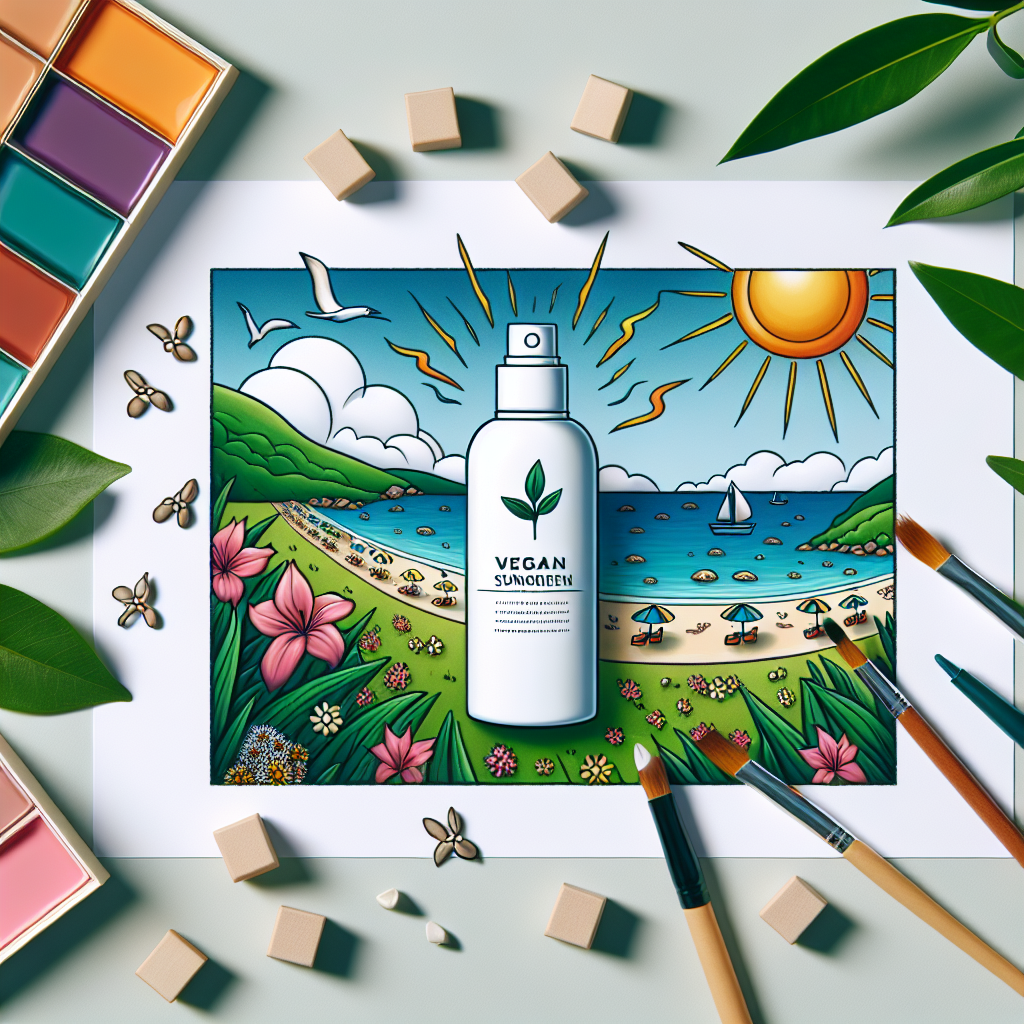Summer is fast approaching, and with it comes the need for a reliable and environmentally-friendly sunscreen. Look no further – we have just the thing! Introducing Vegan Sunscreen, the perfect solution for those seeking sun protection without compromising their values.
This incredible product provides broad-spectrum UVA and UVB protection while being completely cruelty-free and vegan. With Vegan Sunscreen, you can enjoy the sunshine knowing that you are taking care of your skin and the planet at the same time.

What is Vegan Sunscreen?
Vegan sunscreen refers to sunscreens that are free of any animal-derived ingredients and have not been tested on animals. These sunscreens are created using only plant-based, mineral-based, and naturally-derived ingredients. Many people opt for vegan sunscreen because they align with their ethical beliefs and desire to support cruelty-free products.
Definition of Vegan Sunscreen
Vegan sunscreen is a type of sunscreen that is formulated without any animal-derived ingredients. It is made using plant-based and mineral-based ingredients, and does not involve any animal testing. These sunscreens are suitable for individuals following a vegan lifestyle or those who prefer products that are cruelty-free and ethically produced.
Difference between vegan and non-vegan sunscreen
The main difference between vegan and non-vegan sunscreen lies in the ingredients used during the manufacturing process. Non-vegan sunscreens may contain animal-derived ingredients such as beeswax, lanolin, or carmine, whereas vegan sunscreens are completely free of such ingredients. Additionally, non-vegan sunscreens may undergo animal testing, whereas vegan sunscreens are cruelty-free and ethically produced.
Benefits of Vegan Sunscreen
Using vegan sunscreen offers several advantages over non-vegan alternatives.
Protection against harmful UV rays
Vegan sunscreens provide effective protection against both UVA and UVB rays, helping to prevent sunburns, premature aging, and the risk of skin cancer. These sunscreens often contain mineral-based ingredients like zinc oxide and titanium dioxide, which form a physical barrier on the skin to block the harmful rays.
Cruelty-free and ethical
One of the greatest benefits of vegan sunscreen is that it is cruelty-free. This means that it does not involve any animal testing, ensuring that no animals are harmed in the production process. Vegan sunscreen allows individuals to enjoy the sun while supporting ethical and compassionate practices.
Environmentally friendly
Vegan sunscreen is also environmentally friendly as it incorporates natural and plant-based ingredients. These sunscreens are typically biodegradable and do not contribute to the pollution of marine ecosystems. Choosing vegan sunscreen helps to protect both your skin and the environment.
Ingredients in Vegan Sunscreen
Vegan sunscreen contains various ingredients that are derived from minerals, plants, and natural extracts.
Mineral-based ingredients
Mineral-based ingredients such as zinc oxide and titanium dioxide are commonly found in vegan sunscreens. These ingredients provide excellent broad-spectrum protection against UVA and UVB rays. They work by sitting on top of the skin and reflecting the sun’s rays.
Plant-based ingredients
Many vegan sunscreens utilize plant-based ingredients like aloe vera, green tea extract, and coconut oil. These ingredients help to provide additional nourishment to the skin while offering protection against sun damage. Plant-based ingredients can soothe and moisturize the skin, making them great choices for individuals with sensitive skin.
Natural oils and extracts
Vegan sunscreens often contain natural oils such as jojoba oil, avocado oil, or shea butter. These oils help to keep the skin moisturized and prevent it from drying out in the sun. Extracts from plants like chamomile and calendula are also commonly used for their soothing and calming properties.
Common Vegan Sunscreen Options
There are several reputable brands that offer vegan sunscreen, catering to a wide range of preferences and skin types.
Brands offering vegan sunscreen
Popular vegan sunscreen brands include Alba Botanica, Badger, Derma E, and Sun Bum. These brands are committed to producing vegan products that provide effective sun protection without compromising on ethics or quality. They often offer a range of SPF options to suit different skin types and preferences.
SPF levels for different skin types
It’s important to choose a vegan sunscreen with the appropriate SPF level for your skin type. The American Academy of Dermatology recommends using a broad-spectrum sunscreen with an SPF of 30 or higher for daily use. Fair-skinned individuals or those with a history of sunburns may require a higher SPF for adequate protection.
Variations in consistency and application
Vegan sunscreens come in various forms, including lotions, creams, sprays, and sticks. Some are specifically formulated for the face, while others are suitable for the body. Consider factors such as your skin type, preferred texture, and ease of application when choosing a vegan sunscreen.

How to Choose the Right Vegan Sunscreen
When selecting a vegan sunscreen, there are several factors to consider to ensure that you find the right product for your needs.
Identifying vegan labels and certifications
Look for products with clear vegan labels or certifications from reliable organizations such as PETA’s Beauty Without Bunnies or the Vegan Society. These labels guarantee that the sunscreen is truly vegan and cruelty-free.
Checking SPF levels and broad-spectrum protection
Ensure that the vegan sunscreen provides broad-spectrum protection, meaning it protects against both UVA and UVB rays. Additionally, check the SPF level to ensure it suits your sun exposure needs.
Considering personal skin type and sensitivities
Consider your skin type and any specific sensitivities you may have. If you have sensitive skin, opt for a vegan sunscreen with gentle, non-irritating ingredients. Individuals with oily skin might prefer lightweight, non-greasy formulations, while those with dry skin may benefit from a moisturizing vegan sunscreen.
Application and Usage Tips
To get the most out of your vegan sunscreen, follow these application and usage tips:
Applying vegan sunscreen for maximum effectiveness
- Apply vegan sunscreen generously to all exposed areas of the body at least 15 minutes before sun exposure.
- Pay attention to commonly neglected areas such as the ears, back of the neck, and tops of the feet.
- Be sure to apply sunscreen to areas that may be covered by clothing or accessories, as UV rays can penetrate fabrics.
Reapplying sunscreen throughout the day
- Reapply vegan sunscreen every two hours or more frequently if you are swimming, sweating, or toweling off.
- Remember to reapply after spending extended periods in the water, even if the sunscreen claims to be waterproof.
Using sunscreen in combination with other sun protection methods
- Wear protective clothing, such as hats and sunglasses, to further shield your skin from the sun.
- Seek shade during the peak hours of the day when the sun’s rays are strongest.
- Remember that sunscreen is just one component of a comprehensive sun protection routine.

Addressing Concerns and Debunking Myths
Let’s address some common concerns and debunk myths surrounding vegan sunscreen.
Can vegan sunscreen be as effective as non-vegan options?
Yes, vegan sunscreens can be just as effective as non-vegan options. The effectiveness of a sunscreen primarily depends on its SPF level and whether it provides broad-spectrum protection. As long as these criteria are met, vegan sunscreens can provide the same level of sun protection as any other sunscreen.
Do vegan sunscreens leave a white residue?
Some vegan sunscreens may leave a white residue due to the presence of mineral-based ingredients. However, many brands now offer lightweight formulas that avoid this issue. Opt for a vegan sunscreen with a clear or tinted formulation if you prefer to avoid any potential white cast.
Are all vegan sunscreens reef-safe?
Not all vegan sunscreens are automatically reef-safe, but many brands now offer reef-safe options. Reef-safe sunscreens do not contain ingredients that are harmful to coral reefs and marine life. When choosing a vegan sunscreen, look for ones that specifically state they are reef-safe to minimize environmental impact.
The Importance of Sun Protection
Understanding the importance of sun protection can motivate us to prioritize our skin’s health.
Harmful effects of prolonged sun exposure
Prolonged sun exposure without protection can lead to various harmful effects on the skin. These include sunburns, premature aging, sunspots, and an increased risk of skin cancer. Protecting our skin from the sun’s harmful rays is essential for maintaining healthy and youthful-looking skin.
Skin cancer risks and prevention
Skin cancer is the most common type of cancer worldwide, and exposure to ultraviolet radiation is a significant risk factor. Regularly using sunscreen, seeking shade, wearing protective clothing, and avoiding excessive sun exposure can significantly reduce the risk of developing skin cancer.
Aging effects due to sun damage
The sun’s rays can accelerate the aging process, leading to fine lines, wrinkles, and age spots. By wearing vegan sunscreen daily, we can minimize sun-related skin damage and maintain a youthful appearance for longer.

Other Vegan Sunscreen Alternatives
In addition to traditional sunscreen options, there are other vegan alternatives to protect your skin from the sun.
Vegan tinted moisturizers with SPF
For those who prefer a more lightweight and natural-looking option, vegan tinted moisturizers with SPF offer a convenient all-in-one solution. These products provide hydration, light coverage, and sun protection in a single application.
DIY vegan sunscreen recipes
Some individuals prefer to make their own vegan sunscreen using natural ingredients. DIY sunscreen recipes often involve ingredients such as shea butter, coconut oil, and zinc oxide. It’s important to note that while DIY options can be effective, they may not provide the same level of sun protection or stability as commercially manufactured sunscreens.
Alternate sun protection methods for sensitive skin
Individuals with extremely sensitive skin may find that sunscreen irritates their skin. In such cases, seeking shade, wearing protective clothing, and using physical barriers like hats and umbrellas are alternative methods to minimize sun exposure.
Conclusion
Vegan sunscreen offers several benefits, including protection against harmful UV rays, cruelty-free and ethical production, and environmental friendliness. With a wide range of options available, it’s easy to find a vegan sunscreen that suits your preferences and skin type. By making conscious choices for sun protection and prioritizing the health of our skin, we can enjoy the sun while keeping ourselves safe and supporting ethical practices. Remember, protecting your skin today means healthier and more youthful-looking skin in the future. So don’t forget to slather on the vegan sunscreen and enjoy the sun responsibly!





